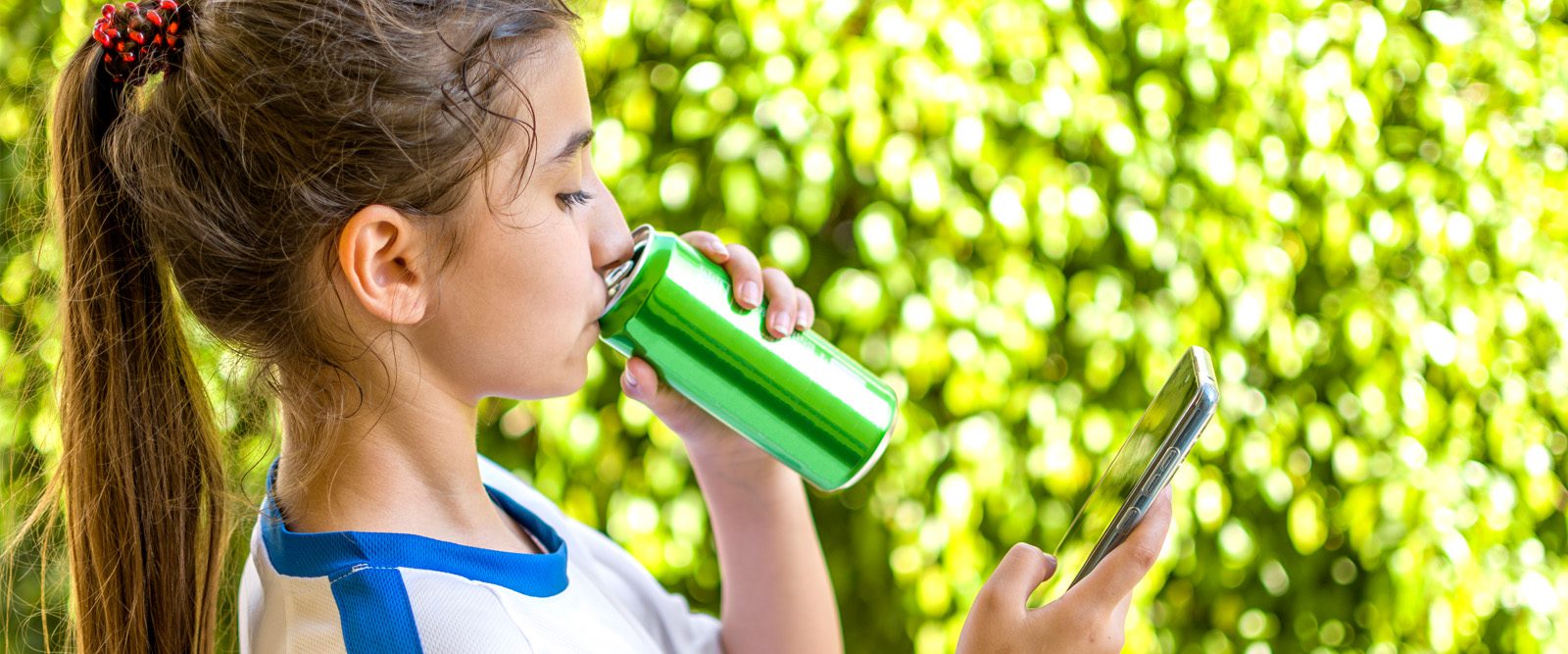Are Energy Drinks Safe for Kids?
A pediatrician explains why the latest energy drinks craze is a hidden health risk for kids.


Walk down the drinks aisle of any grocery store today, and you will likely see a row of bright, neon-colored, flashy cans of energy drinks. Backed by popular influencers and celebrities, the beverages have become an obsession — especially among young children and teens.
“Companies are marketing these drinks as giving children ‘energy,’ but the truth is energy drinks give kids a harmful caffeine rush and a crash afterwards,” says Dr. Edith Bracho-Sanchez, director of pediatric telemedicine at NewYork-Presbyterian’s Ambulatory Care Network and assistant professor of pediatrics at Columbia University Vagelos College of Physicians and Surgeons. “We have to reframe the conversation. Energy should come from a good night’s sleep, a nutritious meal with protein and vitamins, and limiting screen time, so kids can perform throughout the day.”

Dr. Edith Bracho-Sanchez
Because of the high level of caffeine, energy drinks are a serious health concern for children. The American Academy of Pediatrics recommends that children under the age of 12 do not consume caffeinated drinks, while adolescents between the ages of 12 and 18 should limit their intake to less than 100 milligrams per day — some energy drinks contain twice that.
Health Matters spoke to Dr. Bracho-Sanchez about why energy drinks are harmful for children and what liquids are safest to keep kids hydrated.
What is an energy drink?
Dr. Bracho-Sanchez: Energy drinks that have some sort of stimulant in them, and most frequently, it is caffeine. These drinks can have anywhere from 120 to 200 milligrams of caffeine. For comparison, 200 milligrams of caffeine is the equivalent of two cups of coffee or six cans of caffeinated cola.
What gets lost in the discussion is that kids are not sensitized to caffeine, and sometimes they are consuming multiple servings because they’re hanging out with friends or trying different flavors at the same time.
Why are energy drinks a health risk?
Anyone — adults, kids, or teens of any size — who consumes that much caffeine in one sitting and is not used to it may experience anxiousness, jitters, headaches, heart palpitations, or gastrointestinal problems like diarrhea. And if you keep consuming energy drinks, it can lead to more serious long-term health risks, like abnormal heart rhythms. Also, the caffeine really interferes with sleep, which is critical for kids and teens as their brains develop.
Does the color of the drink matter?
Added dyes and chemicals are not healthy for anyone. There is some research on how food additives in children’s products may be harmful for health in the long term. For my own child, I always try to buy products — whether it’s medicine or drinks — that are free of dyes or added chemicals because they don’t provide any nutrition.
What is the difference between an energy drink and a hydration drink?
Hydration drinks contain electrolytes and sugar, but they do not have caffeine. The problem with hydration drinks is that the amount of sugar varies according to the brand, so it’s hard as a parent to know which one to choose.
Some hydration drinks have a ton of sugar. I have families who are trying to be healthier by engaging in exercise, which is so positive, but right afterwards they consume all that excess sugar. If you are going to buy a hydration drink, look at the nutrition label and buy one that has only a little bit of sugar and a complete set of electrolytes. You can talk to your pediatrician about which brand would be best based on the activity your child is doing and their age.
So what is the best beverage for kids to drink?
Water. There are ways to make water fun and more appealing to kids and teens. For example, you can add some flavor with mint or cucumber, or you can let them customize their own water bottles. Also, in the case of younger kids, milk is a healthy option.
Do you ever recommend hydration drinks for kids?
If you have a teen or older child who is engaging in athletic activities that are really demanding — for example, they’re out in the sun, playing soccer or basketball for hours — a hydration drink makes sense because it will replenish electrolytes. Kids who are sick with a stomach virus also may need to replace electrolytes.
These examples are very different from when a healthy child is just hanging out with friends and wants to drink something that’s flavored. I think you can be flexible if it’s a hydration drink that’s low in sugar.
What advice do you have for parents and caregivers who are trying to prevent their kids from having energy drinks?
First, model good behavior, and definitely don’t drink it yourself. Second, lay the groundwork. Educate your kids about the dangers of energy drinks, so in the checkout line they know where you stand. And if they keep pushing, I tell parents that “no” is a complete sentence. My style as both a pediatrician and a parent is that kids need us to provide limits. If the answer is “no” to having an energy drink, that’s OK. Even if they’re mad in the short term, they will be grateful in the long term.

